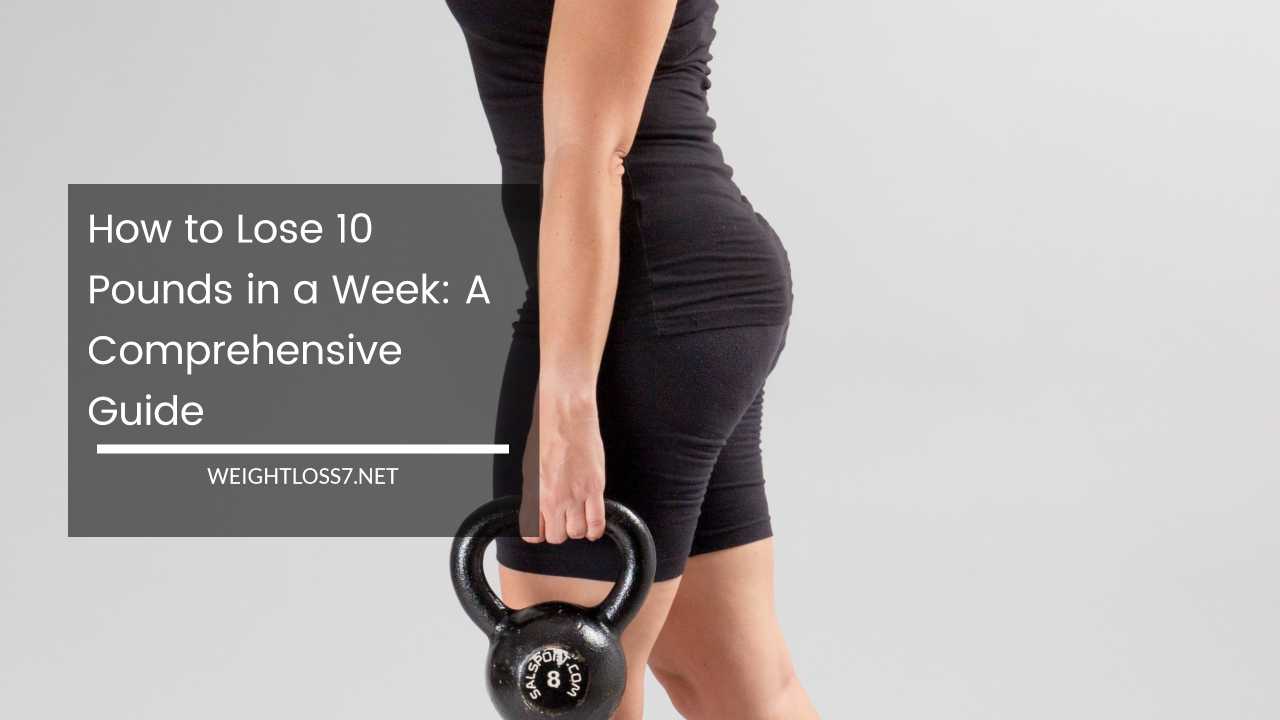How to Lose 10 Pounds in a Week: A Comprehensive Guide

How to Lose 10 Pounds in a Week
Losing weight can be a challenging journey, but with the right approach and dedication, it is possible to shed those extra pounds.
If you’re looking to lose 10 pounds in a week, you’re in the right place. This article will guide you through effective strategies, dietary adjustments, and lifestyle changes that can help you achieve your weight loss goal.
With a combination of a balanced diet, regular exercise, and healthy habits, you can kick-start your weight loss journey and see significant results within a week.
Losing weight is a common goal for many people, and the desire to shed 10 pounds in a week can be particularly enticing.
However, it’s essential to approach weight loss with caution, as rapid and drastic changes to your diet and exercise routine can have negative effects on your health.
Before embarking on any weight loss plan, it’s essential to consult with a healthcare professional to ensure that your approach is safe and suitable for your individual needs and health conditions.
Understanding Weight Loss
Before diving into the strategies for losing 10 pounds in a week, it’s essential to understand the fundamentals of weight loss.
Weight loss occurs when you burn more calories than you consume, creating a calorie deficit. To lose one pound of body weight, you need to achieve a calorie deficit of approximately 3,500 calories.
While a pound a week may be a reasonable and sustainable goal for most people, losing 10 pounds in a week would require a calorie deficit of approximately 35,000 calories, which is a significant challenge and may not be safe for everyone.
A more realistic approach to losing weight is to aim for a calorie deficit that leads to a gradual and sustainable weight loss over time.
Setting Realistic Goals
As mentioned earlier, setting realistic and achievable goals is essential for any weight loss journey. While the idea of losing 10 pounds in a week may be appealing, it’s crucial to prioritize your health and well-being.
Rapid weight loss can lead to nutrient deficiencies, muscle loss, and other health issues. Instead, aim for a safe and sustainable weight loss rate of 1-2 pounds per week.
Setting smaller milestones and celebrating each achievement can help you stay motivated throughout your weight loss journey.
Remember that weight loss is not a linear process, and there may be fluctuations along the way. Focus on making positive changes to your lifestyle and habits, rather than just the number on the scale.
Creating a Calorie Deficit
To lose weight, you need to consume fewer calories than your body burns. This is typically achieved through a combination of diet and exercise.
As mentioned earlier, to lose one pound of body weight, you need to create a calorie deficit of approximately 3,500 calories. For 10 pounds of weight loss, the calorie deficit required would be around 35,000 calories.
Creating such a massive calorie deficit in a week is not only challenging but also potentially harmful to your health.
It could lead to nutrient deficiencies, muscle loss, and a slowdown of your metabolism. Instead, focus on creating a modest calorie deficit through a combination of diet and exercise.
Dietary Adjustments
Making smart dietary choices is crucial for weight loss. Here are some dietary adjustments you can make to support your weight loss goals:
- Choose Nutrient-Dense Foods: Focus on foods that provide essential nutrients without excessive calories. Incorporate plenty of fruits, vegetables, whole grains, lean proteins, and healthy fats into your diet.
- Portion Control: Be mindful of portion sizes, as even healthy foods can contribute to weight gain if consumed in excess. Use smaller plates and bowls to help control portion sizes.
- Limit Processed Foods: Processed foods are often high in calories, unhealthy fats, and added sugars. Minimize your intake of processed and fast foods.
- Stay Hydrated: Drinking water can help control appetite and prevent overeating. Aim to drink at least 8-10 glasses of water per day.
- Avoid Sugary Beverages: Sugary drinks like soda and fruit juices are calorie-dense and can contribute to weight gain. Opt for water, herbal teas, or flavored water without added sugars.
- Mindful Eating: Pay attention to what and when you eat. Avoid distractions while eating, such as watching TV or using your phone, as this can lead to overeating.
- Meal Planning: Plan your meals in advance to avoid making unhealthy food choices when you’re hungry or in a hurry.
Regular Exercise
Physical activity is a crucial component of any weight loss plan. Engaging in regular exercise can help you burn calories, build lean muscle mass, and boost your metabolism.
Here are some exercise tips to support your weight loss journey:
- Cardiovascular Exercise: Incorporate aerobic activities such as walking, jogging, running, swimming, or cycling into your routine. Aim for at least 150 minutes of moderate-intensity aerobic exercise or 75 minutes of vigorous-intensity exercise per week, as recommended by health authorities.
- Strength Training: Include strength training exercises at least two days per week. Strength training helps build muscle, which can increase your resting metabolic rate and promote fat loss.
- High-Intensity Interval Training (HIIT): HIIT involves alternating short bursts of intense exercise with periods of rest or low-intensity exercise. It can be an effective way to burn calories and improve cardiovascular fitness in a shorter amount of time.
- Active Lifestyle: Look for opportunities to be more active throughout the day. Take the stairs instead of the elevator, walk or bike instead of driving short distances, and find activities you enjoy that get you moving.
- Find an Exercise Buddy: Exercising with a friend or family member can make workouts more enjoyable and help you stay motivated.
- Listen to Your Body: If you’re new to exercise or have any health concerns, consult with a fitness professional to design a safe and effective exercise program tailored to your needs.
Healthy Habits
In addition to dietary adjustments and regular exercise, adopting healthy lifestyle habits can support your weight loss efforts and overall well-being:
- Adequate Sleep: Getting enough quality sleep is essential for weight management. Lack of sleep can disrupt hunger hormones and lead to increased cravings for unhealthy foods.
- Stress Management: High stress levels can contribute to emotional eating and weight gain. Find healthy ways to manage stress, such as meditation, yoga, or spending time in nature.
- Mindfulness and Emotional Eating: Be mindful of your emotions and how they relate to your eating habits. Practice techniques to manage emotional eating, such as journaling or seeking support from a counselor or therapist.
- Avoid Extreme Diets: Extreme diets that severely restrict calories or eliminate entire food groups are not sustainable and can be harmful to your health. Focus on balanced, nutrient-dense meals that support your body’s needs.
The Importance of Hydration
Staying hydrated is essential for overall health and can support your weight loss efforts. Water helps transport nutrients, regulate body temperature, and remove waste products from the body.
When it comes to weight loss, drinking enough water can provide several benefits:
- Appetite Control: Drinking water before meals can help you feel fuller, reducing the likelihood of overeating.
- Metabolism Boost: Some studies suggest that drinking water can temporarily boost metabolism, helping you burn more calories.
- Calorie-Free Hydration: Unlike sugary beverages, water is calorie-free, making it an excellent choice for those aiming to lose weight.
Meal Planning and Portion Control
Effective meal planning and portion control are key components of any successful weight loss journey. Here are some tips to help you plan balanced meals and control portion sizes:
- Plan Ahead: Take time to plan your meals for the week, including breakfast, lunch, dinner, and snacks. This can help you make healthier choices and avoid impulse eating.
- Include All Food Groups: A balanced meal should include a variety of food groups, such as fruits, vegetables, lean proteins, whole grains, and healthy fats.
- Protein Power: Protein-rich foods can help you feel fuller for longer and support muscle maintenance during weight loss. Include sources of lean protein such as chicken, turkey, fish, tofu, beans, and lentils in your meals.
- Vegetable Variety: Aim to fill half your plate with non-starchy vegetables like leafy greens, broccoli, cauliflower, peppers, and zucchini. These foods are low in calories and high in nutrients.
- Watch Your Carbs: While carbohydrates are an essential energy source, choose whole grains like brown rice, quinoa, and whole wheat over refined grains like white rice and white bread.
- Healthy Fats: Include sources of healthy fats, such as avocados, nuts, seeds, and olive oil, in moderation. Healthy fats can help you feel satisfied and are vital for overall health.
- Mindful Eating: Eat slowly and pay attention to your body’s hunger and fullness cues. Stop eating when you feel satisfied, rather than stuffed.
- Small Plates: Using smaller plates and bowls can help control portion sizes and prevent overeating.
- Avoid Emotional Eating: Be mindful of emotional eating and find alternative ways to cope with stress or boredom.
- Stay Hydrated: As mentioned earlier, drinking enough water throughout the day can support your weight loss efforts and help control appetite.
Managing Stress and Getting Adequate Sleep
Stress and sleep play significant roles in weight management. High levels of stress can lead to emotional eating and poor food choices, while inadequate sleep can disrupt your metabolism and increase cravings. Here are some tips to manage stress and improve sleep:
- Stress-Relief Strategies: Find healthy ways to manage stress, such as meditation, deep breathing exercises, yoga, or spending time in nature.
- Mindfulness Practices: Engage in mindfulness practices to become more aware of your thoughts and emotions, helping you make healthier choices and reduce stress-related eating.
- Regular Exercise: Physical activity can be an effective stress-reliever and can improve the quality of your sleep.
- Create a Bedtime Routine: Establish a bedtime routine to signal to your body that it’s time to wind down. This may include reading, taking a warm bath, or practicing relaxation techniques.
- Limit Screen Time: Minimize exposure to electronic devices before bedtime, as the blue light can disrupt your sleep patterns.
- Sleep Environment: Ensure your bedroom is conducive to sleep, with a comfortable mattress, appropriate room temperature, and minimal noise and light disturbances.
- Consistent Sleep Schedule: Try to go to bed and wake up at the same time every day, even on weekends.
Surrounding Yourself with Support
Embarking on a weight loss journey can be challenging, but having a support system can make a significant difference. Here are some ways to seek support and accountability:
- Share Your Goals: Share your weight loss goals with friends and family who can provide encouragement and support.
- Join a Support Group: Consider joining a weight loss support group or an online community where you can connect with others who are on a similar journey.
- Seek Professional Guidance: If you’re struggling with weight loss or have specific health concerns, consider seeking the guidance of a registered dietitian, nutritionist, or personal trainer.
- Celebrate Your Progress: Celebrate your achievements, no matter how small they may seem. Recognizing your efforts can help you stay motivated and committed to your weight loss goals.
Conclusion
Losing 10 pounds in a week is an ambitious goal that may not be feasible or safe for everyone. Rapid weight loss can lead to various health issues and may not be sustainable in the long term.
Instead, focus on creating a balanced and sustainable approach to weight loss by making smart dietary choices, engaging in regular exercise, managing stress, and getting adequate sleep.
Remember, weight loss is a journey, and it’s essential to be patient and kind to yourself along the way. Small, consistent changes to your lifestyle and habits can lead to significant and lasting results.
Always consult with a healthcare professional before starting any weight loss program, especially if you have any underlying health conditions.
Stay focused, stay dedicated, and celebrate your progress as you work towards a healthier and happier you.
FAQ’s (Frequently Asked Questions)
Can I lose 10 pounds in a week without exercise?
While exercise can significantly contribute to weight loss, it’s possible to lose 10 pounds in a week through dietary modifications alone. However, incorporating physical activity into your routine can enhance your results and provide additional health benefits.
Are crash diets effective for rapid weight loss?
Crash diets, which involve severe calorie restriction and restrictive eating patterns, may result in rapid weight loss initially. However, they are not sustainable in the long term and can have negative impacts on your health. It’s best to focus on making healthy, balanced lifestyle changes for sustainable weight loss.
Can I drink coffee while trying to lose weight?
Moderate coffee consumption can be part of a healthy diet and may even boost your metabolism. However, it’s important to be mindful of added sugars and high-calorie additives, such as cream and syrups. Opt for black coffee or use minimal amounts of low-calorie sweeteners.
Can I eat out while following a weight loss plan?
Eating out can be challenging when trying to lose weight, as restaurant meals often contain hidden calories. However, you can make healthier choices by opting for grilled or steamed dishes, requesting dressings and sauces on the side, and controlling portion sizes. It’s also helpful to check the menu in advance and plan your order.
Is it possible to maintain weight loss after achieving my goal?
Maintaining weight loss requires a long-term commitment to healthy habits. After achieving your weight loss goal, continue to prioritize regular exercise, balanced nutrition, and mindful eating. Regularly monitoring your weight and making adjustments as needed can help you maintain your progress.
What should I do if I hit a weight loss plateau?
Weight loss plateaus are common and can be frustrating. If you reach a plateau, reassess your diet and exercise routine. Consider adjusting your calorie intake or incorporating new exercises to challenge your body. Consulting with a healthcare professional or a registered dietitian can provide personalized guidance and support.

















